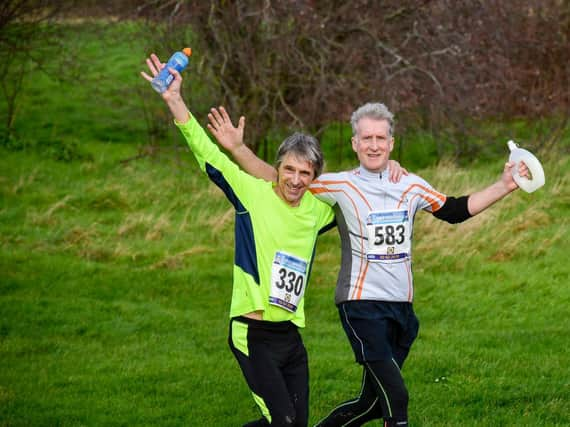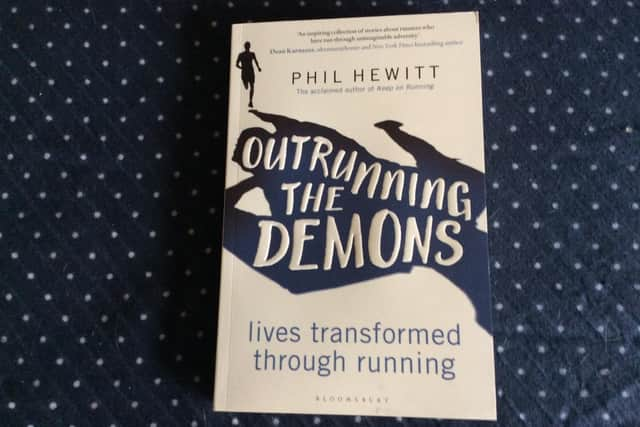Why running is my lockdown release


The description is spot on – and somehow even more spot on than ever in these shutdown times when anxiety is never terribly far away; times when it seems there is very little escape from anything.
However, the escapes are there. We just need know where to look.
Advertisement
Hide AdAdvertisement
Hide AdMine has always been – and I hope will always be – running, that simple act of putting one foot in front of the other at speed.


It’s a simple act which manages to be both prosaic and yet magical.
Running is exhilarating but exhausting; it is draining and yet enriching; it is depleting and yet restorative; sobering and yet intoxicating. It is individual and yet collective; it is sweaty and yet beautiful; it is art and, yes, it is science too.
Running is accessible and yet so often remarkable; a challenge and yet a delight; and perhaps above all it somehow manages to be both freedom and connection.
Advertisement
Hide AdAdvertisement
Hide AdHow can we possibly ever explain it entirely? All I know for certain is that I would never have coped without it – particularly right now.
As soon as lockdown loomed, my PTSD symptoms ramped up. My response was to go for a run. I ran through torrential rain on that early March day; I even ran through swirling snow flurries; and then I ran through deep, skiddy mud on the way back. But I returned home purified, rebalanced, so much better able to cope.
And that’s why I am sure so many people are finding running so important a resource in their mental armoury right now in these awful, terrible days we are living through.
The point is that running can silence the demons. It can quell the questions that won’t go away – in my case, the questions that have besieged me ever since the day, four years ago, that a mugger shoved a knife in me and left me to bleed out on a grotty Cape Town pavement.
Advertisement
Hide AdAdvertisement
Hide AdWhat did the knife look like? I didn’t see it. Where had my attacker been all day? Did he stab anyone else that day? How grubby was the knife? How many other people did he stab that day? How many people has he stabbed since?
Does he remember me? Is he even alive still? Surely, you can’t carry on doing what he was doing with impunity.
But above all, I want to know: what would have happened if my rescuer hadn’t stopped and bundled me into his car? What would have happened if I had been left on the pavement just a few minutes more, unable to stand, blood – my blood – pooling around me.
And that’s the trouble with being stabbed – assuming you survive.
Advertisement
Hide AdAdvertisement
Hide AdThe real problem isn’t so much the knife that goes into you. The real problem is the mess of thoughts it leaves behind – thoughts, in my case, far harder to deal with than the physical injuries.
And that’s where running came in – a story I tell in my book Outrunning The Demons, published by Bloomsbury last year and available from Amazon at https://www.amazon.co.uk/Outrunning-Demons-Transformed-through-Running/dp/1472956516/ref=sr_1_10?s=books&ie=UTF8&qid=1535025323&sr=1-10&refinements=p_27%3APhil+Hewitt
It’s a book which was written in blood, sweat and tears.
I was walking back from watching England lose a one-day international against South Africa at the gorgeous Newlands cricket ground in Cape Town. And I was stupid. I made bad decision after bad decision. I carried on walking when I should have walked back, and I walked straight into danger – danger quickly realised.
In a ghastly, grim, crime-ridden suburb, I was stabbed twice in the leg by a mugger demanding my camera. The weird thing is that the stabs felt like punches, which is probably why I fought back. I pulled him to the ground, where he started kicking me in the back, which was the moment I looked down to see my leg was awash with blood. No, those punches most definitely weren’t punches.
Advertisement
Hide AdAdvertisement
Hide AdI let go of my camera, and my attacker got to his feet and loomed over me. I wasn’t getting up. To make doubly sure, he unleashed a volley of kicks to my chest and stomach before legging it through the rubble and undergrowth.
Thank goodness, a passing pizza delivery driver stopped within a couple of minutes. There was an awful lot of blood. He shoved me into his car just as I was thinking that my number was probably up.
And he whisked me to hospital. 15 stitches. Three broken ribs. A bruised liver. And one very, very messed-up head. And that was the problem. It let those questions in…. questions which bubbled and brooded and simmered and festered until the day, three weeks later, they erupted in a panic attack. In Boots in Fareham, of all places… and believe me, you can’t get anywhere less threatening than Boots in Fareham.
So what did I do? The next day I did what I have always done. I ran. And it hurt like hell. Broken ribs. Flesh barely healed. But something lifted. Running gave me strength. It makes me me again, and it was running that started to put me back together again – a story I wanted to tell.
Advertisement
Hide AdAdvertisement
Hide AdI approached publishers Bloomsbury in London. They asked me to broaden the story, to interview runners around the world who have shared experiences similar to mine, and in that moment, Outrunning The Demons was born.
The book starts with my first marathon after the stabbing, my 31st marathon in all (I have now done 40) and it finishes with that marathon’s finishing line, a moment when the emotion was simply overwhelming.
In between are 34 interviews with people from the UK, the US and Australia who have been to hell and have found that the surest, quickest, safest way back is to run.
These are people who have lost loved-ones to murder, have been caught up in terrorism, have suffered depression, addiction, alcoholism or bereavement, have been viciously attacked, have braved horrid illness, have suffered the horrors of war or been on the wrong end of outrageous misfortune.
Advertisement
Hide AdAdvertisement
Hide AdBut the thing that links them all is that they have found space and time and connection through running. Running has helped them grieve; it has helped them heal; it has given them freedom; it has renewed and nurtured them; it has helped them move on, re-emerge, reclaim their lives and become stronger people.
It's probably a terrible thing to admit, but just over a year after publication, I found myself re-reading my own book the other day. These were the stories I wanted to read in the early months after the stabbing – and they are the stories I want to read now, stories of fantastic people. Wonderful people. Open. Warm. Wise. Generous. Brave.
And they are the stories I carry with me in my head as I continue to run in lockdown Britain.
Yes, I never stray far. And yes, I always wear a mask. It is crucial that runners don’t suddenly start to get blamed. We absolutely must keep our distance; and we absolutely must show that we have absolutely no intention of puffing or panting over anyone.
Advertisement
Hide AdAdvertisement
Hide AdIf we behave, we will be allowed to run… and I don’t know how I would cope without.
It is so noticeable that since lockdown began, my absurd, off-the-top-of-scale PTSD jumpiness has rocketed. My poor wife. She offers me a cup of tea and I react like she has launched at me with a machete. The world’s worst house mate is always there.
But if I go for a run, I instantly dial down; if I go for a run, I plunge myself into the most cleansing mind bath imaginable; if I go for a run, I face my demons – and for a while at least, I outrun them…
I am one of a tiny, tiny club of people – those of us who know exactly what it feels like to think ‘In a couple of minutes I will be dead.'
Advertisement
Hide AdAdvertisement
Hide AdBut if I run, it seems to me that it is a wonderful club to be in. A club of people who truly know the great joy of being alive.
*********
Among the stories in Outrunning The Demons are:
The New York firefighter’s widow who ran the New York City Marathon in his memory after he perished amid the horrors of 9/11
The dad who tried to drown himself in a moment of despair and has since found purpose, strength and happiness through running
The prison officer who connected with his murdered daughter amid the ice floes of the North Pole Marathon
Advertisement
Hide AdAdvertisement
Hide AdThe US army captain’s widow who found an outlet for her grief through running – and went on to unite a nation in commemoration of the fallen
A New York mum to two severely autistic boys who knows that running has saved her family
A naval officer who found himself in a plunging, nosediving jet, only to emerge with PTSD and a horror of all forms of transport. Running was the means by which he reclaimed his life
An Australian PE teacher who was brutally sexually assaulted on an early-morning run – and found that running was the best way to combat the horrors the attack left her with
Advertisement
Hide AdAdvertisement
Hide AdA British firefighter who found that running helped him face the trauma of pulling the bodies of friends and colleagues from a fatal fire
Advertisement
Hide AdAdvertisement
Hide AdAdvertisement
Hide AdAdvertisement
Hide Ad*************
A message from the Editor, Gary Shipton:
In order for us to continue to provide high quality and trusted local news, I am asking you to please purchase a copy of our newspapers.
Advertisement
Hide AdAdvertisement
Hide AdWith the coronavirus lockdown having a major impact on many of our local valued advertisers - and consequently the advertising that we receive - we are more reliant than ever on you helping us to provide you with news and information by buying a copy of our newspapers.
Our journalists are highly trained and our content is independently regulated by IPSO to some of the most rigorous standards in the world. But being your eyes and ears comes at a price. So we need your support more than ever to buy our newspapers during this crisis.
Stay safe, and best wishes.
Gary Shipton
Editorial Director